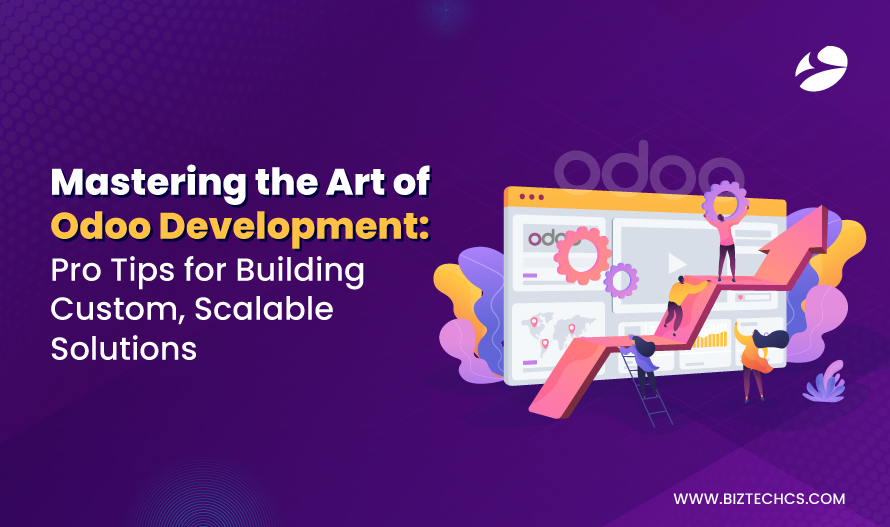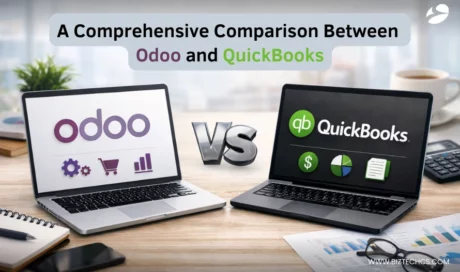4470
Complete Guide to Odoo Development: Pro Techniques for Scalable Business Applications
5 min read
4470
5 min read

Odoo development offers a unique way to create custom solutions for businesses. Mastering this platform can significantly enhance your project’s efficiency. To succeed, you need practical tips and insights tailored for Odoo.
This blog will guide you through essential strategies for building scalable applications. We’ll cover best practices for coding and design that improve performance.
You’ll learn how to leverage Odoo’s powerful features effectively. We’ll also explore common pitfalls to avoid during development. By the end, you’ll be better equipped to tackle Odoo projects confidently.
Why Odoo Development Matters in Modern Business
Odoo development has become crucial for businesses seeking digital transformation. Professional Odoo development services enable companies to automate workflows and integrate systems seamlessly. Whether you’re new to Odoo development or looking to enhance existing implementations, understanding core principles is essential. The demand for skilled Odoo development expertise continues to grow as more enterprises adopt this versatile ERP platform.
In advanced Odoo development, creating custom modules requires a clear understanding of the directory structure.
Each module must include a “__manifest__.py” file that defines its metadata and dependencies. To effectively extend existing models, you should choose between single-table inheritance (STI) and multi-table inheritance (MTI).
Knowing when to use field types like Many2one, One2many, and Many2many is essential for building relationships between models. This structured approach enhances code organization and improves module functionality.
Advanced ORM techniques in Odoo can greatly enhance application performance and usability.
Using the “search_read()” method is key for optimized data retrieval. It combines searching and reading records in a single call, reducing database load.
Mastering domain filters allows developers to filter records efficiently, helping to limit the data returned and speed up queries.
Another valuable technique is implementing computed fields. This automates calculations based on other fields, streamlining data management and enhancing user experience.
By leveraging these methods, developers can create more efficient and responsive Odoo applications.
In advanced Odoo development, creating custom views using XML allows for tailored user interfaces that meet specific business needs.
Different view types, such as forms, trees, and kanban, provide various ways to display data effectively.
Widgets like calendars and many2many_tags enhance user experience by making data interaction more intuitive and engaging.
Custom actions and menu items improve navigation, helping users access features quickly and efficiently. Together, these techniques create a more functional and user-friendly application, boosting productivity and satisfaction.
In advanced Odoo development, implementing record rules is crucial for controlling access to specific records based on user roles. This technique ensures that users can only see and interact with data relevant to their responsibilities.
Access Control Lists (ACLs) further refine this by defining what actions users can perform on various models, such as read, write, create, or delete. Group management allows developers to organize users into specific groups, making managing permissions and access rights easier.
Together, these techniques create a secure environment where data integrity is maintained while providing appropriate user access.
In advanced Odoo development, mastering QWeb templates is essential for creating dynamic HTML views.
QWeb allows developers to build responsive user interfaces using a flexible templating engine. By understanding how to inherit templates, you can easily customize existing views without rewriting code.
Additionally, creating custom controllers enables you to handle HTTP requests and serve tailored web pages, enhancing user experience.
Lastly, developing RESTful services using Odoo’s built-in controllers allows for smooth integration with external systems, making your applications more versatile and connected.
Odoo Development Architecture Deep Dive
Understanding Odoo development architecture is fundamental for building robust solutions. The MVC (Model-View-Controller) pattern in Odoo development separates concerns effectively. Odoo development follows a three-tier architecture: presentation, business logic, and data layers. The odoo development services ecosystem leverages this architecture to ensure seamless customization, efficient module development, and scalable business applications that align with unique organizational needs.
framework’s modular design makes Odoo development scalable and maintainable. Event-driven programming in Odoo development allows for reactive application behavior. Knowledge of Odoo’s ORM layer is essential for efficient database interactions during development.
Odoo is an open-source enterprise resource planning (ERP) framework. It combines various business applications into one platform.
Users can manage sales, inventory, accounting, and more from a single interface. Odoo uses a modular approach, which means businesses can add or remove applications as needed.
The framework is highly customizable, and developers can create new modules to fit specific needs.
Odoo also supports multi-language and multi-currency features. It has a user-friendly interface that simplifies tasks. Overall, Odoo helps businesses streamline operations and improve efficiency.
6. API Development and Integration
Effective Odoo development requires mastery of API integration techniques. XML-RPC and JSON-RPC protocols enable seamless communication between Odoo and external systems. RESTful API development in Odoo allows for modern, scalable integrations. Understanding authentication mechanisms and rate limiting is crucial for secure Odoo development. External API connectors enhance Odoo’s capabilities, making it a central hub for business operations.
7. Performance Optimization in Odoo Development
Optimizing Odoo development projects for performance ensures smooth user experiences. Database indexing strategies reduce query execution time significantly. Lazy loading techniques prevent unnecessary data retrieval during Odoo development. Caching mechanisms improve response times for frequently accessed data. Profiling tools help identify bottlenecks in custom Odoo development code. Proper server configuration and resource allocation are vital for production Odoo development environments.
To master Odoo development, several resources can help you learn effectively. The official Odoo documentation is essential for understanding the framework’s features.
Online courses on platforms like Udemy or Coursera offer structured learning paths. The Odoo community forums are great for asking questions and sharing knowledge with other developers.
YouTube has many tutorials that cover various aspects of Odoo development, from basic to advanced topics.
GitHub repositories provide real-world examples and code samples to study. Lastly, joining local Odoo meetups or conferences can help you network with other developers and gain insights.
Odoo Development Tools and Environment Setup
Setting up an efficient Odoo development environment accelerates productivity. IDEs like PyCharm and VS Code offer excellent support for Odoo development. Docker containers simplify Odoo development environment management and deployment, making it easier to replicate setups across teams. Version control best practices ensure smooth collaboration in Odoo development teams, especially when delivering professional odoo development services that require consistency, code quality, and streamlined workflows. Debugging tools like pdb and Odoo’s built-in logger are invaluable for troubleshooting. Local development servers enable rapid testing during Odoo development cycles.
The Future of Odoo Development
The landscape of Odoo development continues to evolve with emerging technologies. Artificial intelligence integration in Odoo development creates smarter business applications. Mobile-first Odoo development approaches address the growing demand for on-the-go access. Cloud-native Odoo development leverages modern infrastructure for better scalability. Low-code customizations complement traditional Odoo development for faster deployment. Microservices architecture influences modern Odoo development patterns. Investing in Odoo development skills positions you for future opportunities in enterprise software.
In conclusion, mastering Odoo development requires practice and a clear understanding of its framework. Focus on modular design to create scalable solutions that can grow with your business.
Utilize built-in tools and libraries to save time and enhance functionality. Testing is crucial; always validate your code before deployment. Keep learning and stay updated with the latest features and best practices. Collaboration with other developers or choosing to hire Odoo developers can also spark new ideas and solutions.
If you are looking for Odoo developers, we have a team of skilled professionals ready to help you. Our experts can build custom solutions tailored to your specific needs.

Artificial Intelligence (AI)
254
By Nandeep Barochiya

Odoo
299
By Uttam Jain

Artificial Intelligence (AI)
564
By Nandeep Barochiya